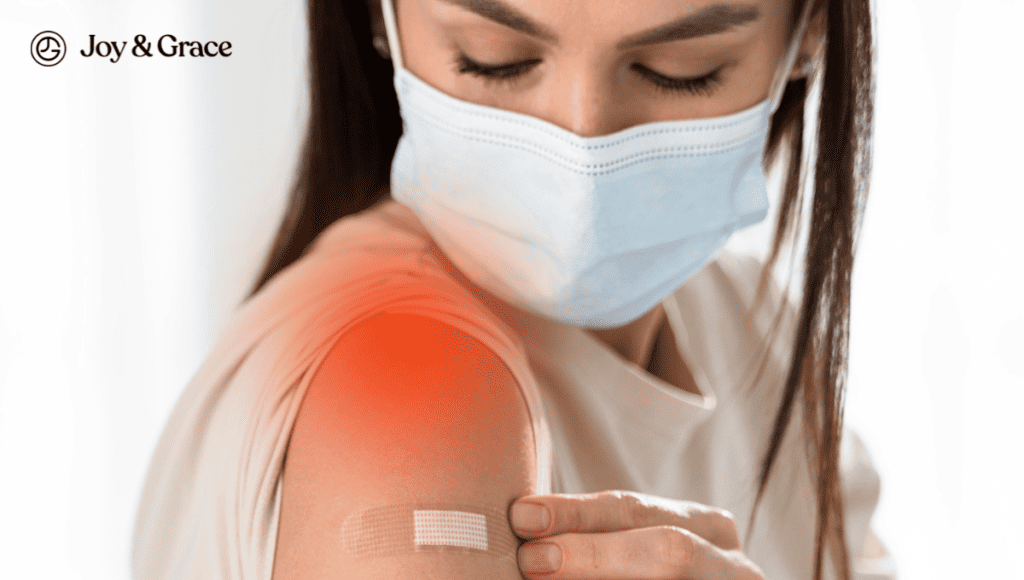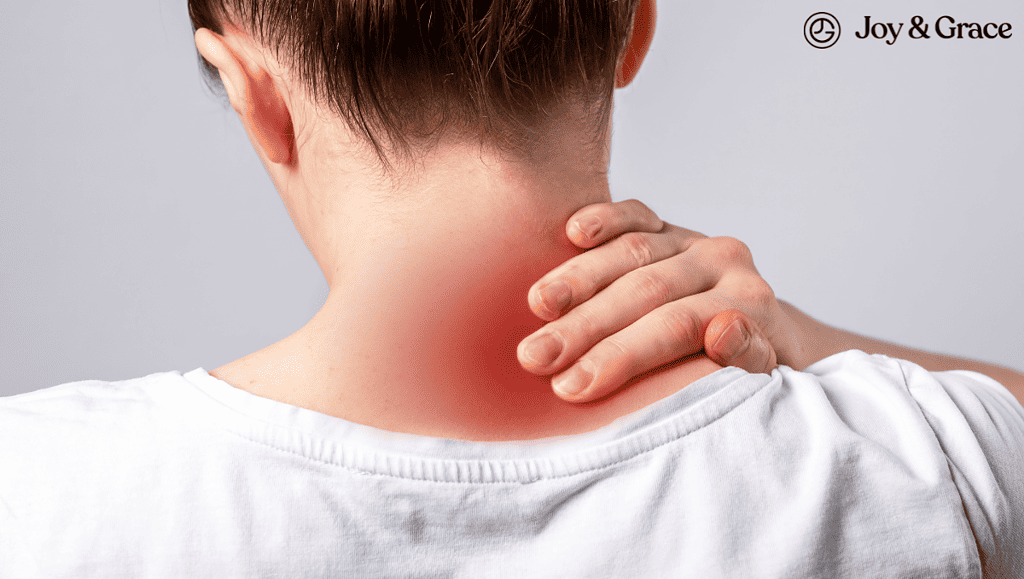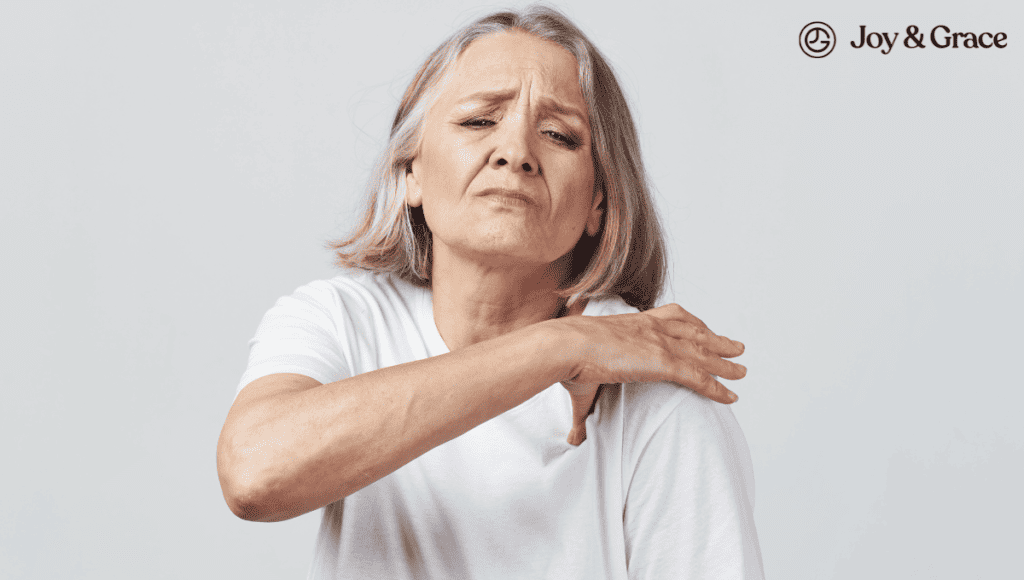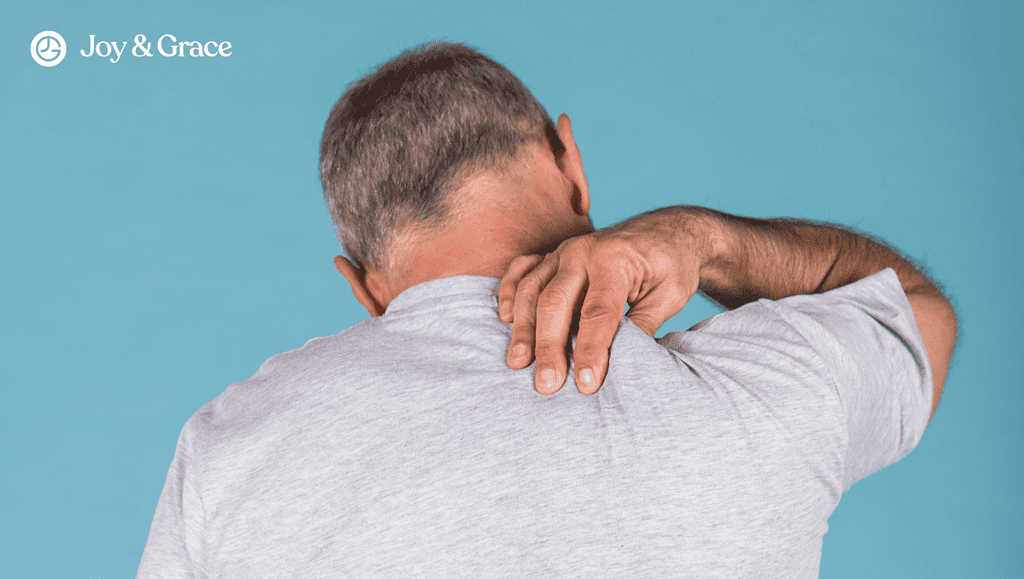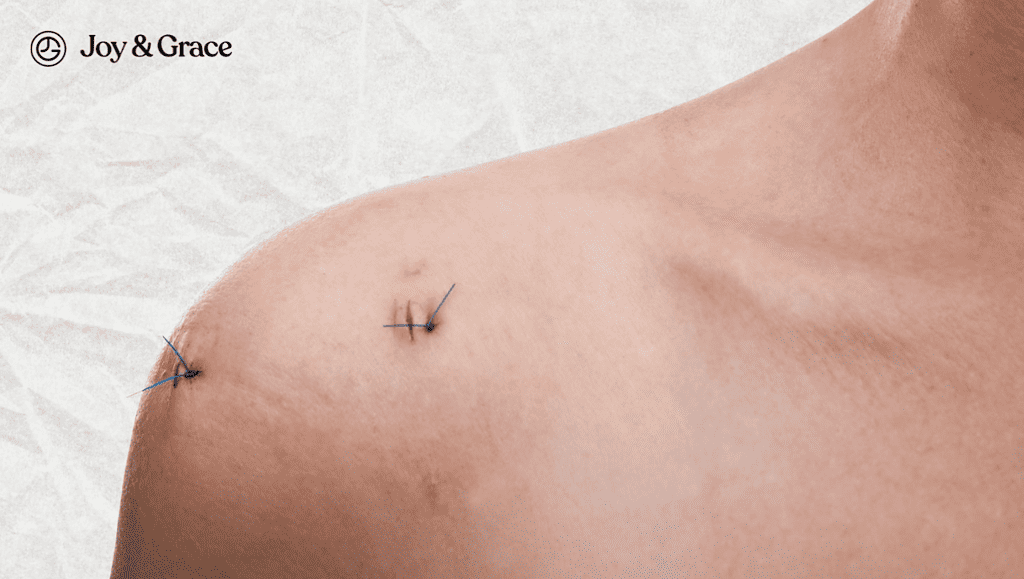Getting vaccinated against influenza, commonly known as the flu, is one of the best ways to protect yourself and others from this potentially serious illness. According to estimates from the CDC, during the 2019–2020 flu season, influenza vaccines prevented approximately 7 million flu illnesses.
However, some people experience shoulder soreness or pain following their annual flu shot. While having mild aches for a couple of days is expected, severe or persistent pain could signal something more serious, though rare. Let’s take a look at how this happens and what you can do to address it.
Why Does My Shoulder Hurt After A Flu Shot?
Getting a flu shot is a widely recommended preventive measure, and mild pain or soreness in the shoulder often comes with the package. This is a normal reaction to the vaccine and usually goes away on its own.
The flu vaccine essentially contains part of the virus, called antigens. These antigens stimulate your immune system to mount an immune response against the virus. This response causes the production of antibodies, the proteins responsible for immunity against the flu.
However, this immune response also causes inflammation, which is responsible for the soreness at the injection site, typically the shoulder.
Additionally, it's important to note that the injection itself, although minor, causes a small amount of trauma to the tissue, which can contribute to the soreness.
This experience is not limited to flu shots and can occur after other vaccinations as well.
Now, let's consider the less common but more serious scenarios.
In some rare cases, significant shoulder pain following a flu shot may indeed signal a more severe issue. Severe shoulder pain post-vaccination, although uncommon, can sometimes arise from:
- A local inflammatory reaction in the shoulder called shoulder injury related to vaccine administration (SIRVA).
- Direct nerve injury
- Brachial neuritis
Let’s dissect these conditions one by one.
Can A Flu Shot Damage My Shoulder?
While it's rare, it's not unheard of for a flu shot to cause shoulder damage. As we mentioned right before you hopped into this section, a flu shot can cause a shoulder injury related to vaccine administration (SIRVA).
According to a study, it’s mostly reported following a flu shot because it is a more common procedure. However, it can still happen after other kinds of vaccination, such as tetanus shots.
And how does it occur, you ask? The flu shot is given into the deltoid muscle (that's the one in the upper arm). If the needle is inserted too high or too deep, it can hit sensitive structures like the shoulder capsule or the rotator cuff.
It’s worth mentioning that SIRVA and its related pain are not linked to the flu vaccine itself but to the injection technique. Most competent healthcare practitioners are well-versed in correct injection techniques. This makes the odds of SIRVA extremely low.
In a study involving people vaccinated for influenza between 2009 and 2018, there was no significant difference in the number of visits for shoulder problems before vaccination (1.1%) compared to after vaccination (1%). This means that shoulder issues did not increase after getting vaccinated. They suggest that the pain may have already existed before the vaccination.
This is echoed by a review stating that some people might mistake pain from an existing shoulder problem as a side effect of the vaccination.
But, according to another study, it’s possible that you might have had an initial shoulder condition that was symptomless or painless. Then, the inflammatory response from the vaccination triggered the appearance of pain and other physical symptoms.
SIRVA can present itself in many ways, including:
- Subacromial Shoulder Bursitis
This is the inflammation of the subacromial bursa. The subacromial bursa is a small, fluid-filled sac. It cushions and reduces friction between the shoulder joint's tendons and the acromion (a bony prominence of the shoulder blade).
Common symptoms include:- Shoulder pain that worsens with arm movement.
- Swelling and tenderness around the shoulder.
- Limited range of motion in the shoulder.
- Rotator Cuff Tendonitis or Tears
This is the inflammation of the tendons or actual tears in the rotator cuff, a group of muscles and tendons that stabilize the shoulder joint.
Common symptoms include:- Pain and tenderness in the shoulder, especially when lifting the arm.
- Weakness in the affected arm.
- Difficulty reaching behind the back.
- Pain that is worse at night or when lying on the affected side
- Adhesive Capsulitis or Frozen Shoulder
This condition causes stiffness and pain in the shoulder joint, limiting its range of motion. The tissues around the joint become inflamed and form adhesions, causing the shoulder to "freeze."
Common symptoms include:- Gradual onset of pain and stiffness in the shoulder.
- Difficulty reaching overhead or behind the back.
- Subcortical Bone Osteitis
Inflammation of the bone just beneath the outer layer (cortex) of a bone.
Common symptoms include:- A deep ache in the bones
- Swelling and tenderness around the affected area.
- Limited movement and stiffness in the shoulder joint.
According to a study, after imaging, subacromial bursitis and rotator cuff injuries were the most common findings.
Can The Flu Shot Cause Shoulder Pain From Nerve Damage?
Yes, as mentioned above, direct injury to a nerve is one of the possible diagnoses for shoulder pain following vaccinations. The flu shot, or influenza vaccine, is given as an intramuscular injection. This means it’s injected into the muscle, usually the deltoid in adults.
Due to the depth of the injection, there’s a slight possibility of the needle hitting a nerve. According to a study, if the needle is inserted too low, there’s a chance of injuring the radial nerve. If inserted too far to the side, the axillary nerve may be injured.
Symptoms of nerve damage include:
- Shooting shoulder pain radiating down towards the arm and hands
- Burning or tingling sensations
- Numbness
- Weakness
If you suspect the injection may have hit a nerve, or if you experience any of these symptoms after a flu shot, seek medical attention immediately.
Can Brachial Neuritis Follow After a Flu Shot?
Brachial neuritis, or neuralgic amyotrophy, is characterized by pain and muscle weakness. Although it’s been reported to occur following a flu shot, it’s considered very uncommon. Furthermore, it can also be due to other conditions, such as infections or autoimmune diseases.
This happens because the immune system mistakenly attacks the nerves, causing inflammation. Infections can directly affect the nerves and trigger the immune system to harm them. In autoimmune diseases, your immune system can mistake the nerves as threats and attack them.
Unlike a direct nerve injury, brachial neuritis does not result from the needle directly hitting a nerve. Instead, it’s believed to be due to the immune system attacking the brachial plexus due to the antigens found in the vaccine.
The brachial plexus is a network of nerves that starts in the neck and extends into the armpit. It’s responsible for innervation of the shoulder, arm, and hand muscles.
In one case, a 46-year-old woman developed severe pain in her left shoulder a few days after receiving the influenza vaccine. After a week, she developed weakness. Upon medical examination, she was diagnosed with brachial neuritis.
The symptoms of brachial neuritis can be divided into three phases:
- In the first phase, you will experience intense, burning pain. It’s often located on one side and can affect the side of the shoulder, shoulder blade, and forearm. The pain will be constant and can be worse at night, causing you to lose sleep. This phase can last a few days to weeks.
- In the second phase, the pain will subside and be replaced by shoulder and upper arm weakness. In rare cases, the hand and forearm can be affected. During this phase, you’ll notice that the shoulder and upper arm muscles will shrink (muscle atrophy).
- The recovery of muscle function typically signals the start of the third phase. This happens gradually over a period of 6 to 18 months. However, some will continue to experience weakness for years or, in rare cases, permanently.
What Are The Symptoms Of SIRVA?
SIRVA is associated with the following symptoms:
- Shoulder pain that starts within 48 hours after getting vaccinated
- Reduced range of motion
- Weakness of the shoulder
- Tingling or numbness
- Persistent shoulder pain
- Swelling
A characteristic of shoulder pain from SIRVA is that it may not respond to over-the-counter painkillers.
Most sources include the following criteria to diagnose SIRVA:
- No prior history of shoulder pain
- Rapid onset of pain right after or less than four days after the vaccination
- Symptoms are only found on the vaccinated shoulder
Why Does My Shoulder Hurt Weeks After Flu Shot?
The mild muscle ache from a flu shot typically lasts one to two days max. However, pain from SIRVA or a nerve injury can persist for weeks or even months. In rare cases, some people may have chronic pain that can last for years.
How Do I Treat Shoulder Pain From The Flu Shot?
Mild shoulder soreness from the flu shot is easy to treat using remedies that you might already have at your disposal. These include:
- Over-the-counter medication
Over-the-counter drugs like acetaminophen or ibuprofen can help relieve the soreness after a flu shot. - Cold Compress
A cold compress can help reduce inflammation at the injection site, relieving shoulder pain. It can also help with the swelling. Use a cold pack or a hand towel soaked in cold water and apply it to the shoulder. - Heat therapy
A warm compress can also help, but at a different time than cold compresses. Use heat once the initial inflammation has subsided. This can relax your aching muscles. A warm bath or heating pad can also help.
Aside from these solutions, it’s important to rest and take it easy. Allow your body to build immunity and avoid any strenuous activity that can worsen your shoulder pain. This includes heavy lifting and sports. In the meantime, perform gentle stretches to keep your shoulder moving.
If your pain persists or worsens for over a week after the flu shot, it might be a sign of SIRVA. This requires a medical evaluation and a different treatment approach.
How Do I Treat SIRVA From A Flu Shot?
If your doctor suspects SIRVA, they usually start with observation and conservative treatment. This includes the measures mentioned above. If this does not relieve the pain, then they may proceed with the following:
- Physical Therapy
If you're having trouble moving your shoulder, a physical therapist can help. They'll give you exercises and stretches to strengthen your shoulder and make it more flexible. - Steroid Injections
Your doctor might suggest corticosteroid injections to reduce inflammation. These injections can help reduce the swelling and ease the pain in your shoulder. Corticosteroid injections can also help with brachial neuritis and nerve injuries. - Surgery
If your shoulder problem is severe and other treatments don't work, surgical intervention might be an option. The surgeon can remove damaged tissues or address issues with the structure of your shoulder. The type of surgery will depend on the specific type of injury and its severity.
Takeaway
A mild shoulder ache after your recent influenza vaccination is nothing to worry about. It’s a sign that your immune system is doing its job to protect you from the seasonal sniffles. This mild soreness typically resolves within 24 to 48 hours.
However, if the pain is severe and persistent, this may be a sign of something more serious. In extremely rare cases, flu shots can lead to a condition called shoulder injury related to vaccine administration or SIRVA. They can also lead to nerve injuries as well.
These conditions only happen when the vaccine is not given properly. Poor needle placement, such as inserting the needle too deep, too high, or too low, can damage the sensitive structures of your shoulder.
Again, the risk is low, and most people experience only minor discomfort, if any, following a flu vaccination. But it's always good to be informed about potential risks. And remember, the flu shot itself is a crucial tool in preventing the flu, which can be a much more serious issue. After all, no one wants to deal with the flu and shoulder pain!
